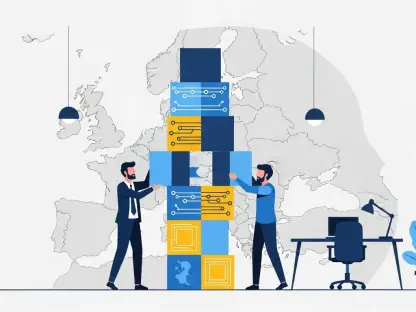Setting the Stage for a Multilingual Enterprise Era
In an increasingly interconnected global economy, the ability to communicate seamlessly across language barriers has become a cornerstone of business success, with the translation services market valued at approximately $40 billion. As enterprises expand their reach across diverse regions, the demand for real-time, AI-driven solutions is surging, and Cisco, a titan in networking technology, has made a pivotal move by acquiring EzDubs, a startup known for its innovative real-time translation technology. This acquisition, announced recently, underscores a critical trend: the race to dominate enterprise communication through advanced language tools.
The significance of this deal lies in its potential to reshape how multinational teams collaborate, breaking down linguistic obstacles in virtual meetings and beyond. By integrating EzDubs’ cutting-edge capabilities, Cisco aims to solidify its position in the collaboration space, where competitors are also vying for market share. This analysis delves into the broader implications of the acquisition, examining market trends, data-driven insights, and future projections for translation technology in enterprise settings. The focus is on understanding how this strategic play reflects evolving industry dynamics and what it means for stakeholders across the board.
Deep Dive into Market Trends and Projections
Real-Time Translation: A Booming Sector in Enterprise Tech
The translation technology sector is witnessing unprecedented growth, driven by globalization and the rise of remote work. Market data indicates that enterprise demand for multilingual communication tools accounts for a significant portion of the $40 billion industry, with growth projected to accelerate through 2027. Companies are increasingly prioritizing solutions that enable instant translation during video calls, customer interactions, and cross-border partnerships. This trend is fueled by the need to reduce miscommunication costs, which studies suggest can impact productivity by up to 20% in global teams.
Cisco’s acquisition of EzDubs, a Y Combinator-backed startup founded by former members of its own Speech AI group, aligns directly with this momentum. EzDubs’ technology, which supports live translation across over 30 languages while preserving a speaker’s voice and tone, addresses a niche but critical pain point: maintaining the human element in automated translations. This capability sets it apart in a market where accuracy and emotional nuance are becoming as important as speed, particularly for industries like tech, finance, and healthcare that rely on precise communication.
The broader landscape reveals a shift toward integrated solutions rather than standalone apps. As businesses seek all-in-one platforms for collaboration, the integration of translation features into existing tools like Cisco’s Webex becomes a competitive edge. This trend suggests that by 2027, over 70% of enterprise collaboration software could feature built-in language capabilities, potentially marginalizing specialized translation providers that fail to adapt or partner with larger entities.
Consolidation and the Enterprise Pivot in Translation Services
A striking pattern in the translation tech market is the rapid consolidation of smaller players by industry giants, reflecting a strategic pivot toward enterprise-focused solutions. Recent deals, such as Seven Seven Six-backed Palabra AI acquiring Talo and TransPerfect’s purchase of Unbabel, highlight how the industry is coalescing around scalable, B2B offerings. EzDubs’ acquisition by Cisco fits squarely into this narrative, especially with the decision to discontinue its consumer-facing apps by mid-December. This move signals a clear focus on high-value enterprise markets over fragmented consumer bases.
Consumer translation apps, while innovative, often struggle with profitability due to competition from free or low-cost alternatives. In contrast, enterprise solutions can command premium pricing for tailored features, security protocols, and integration with existing workflows. The risk for smaller startups in this space is evident: without a pivot to B2B or acquisition by a larger player, sustainability remains elusive. Cisco’s strategy with EzDubs capitalizes on this disparity, positioning the company to tap into a lucrative segment where demand for customized language tools continues to outpace supply.
Regional dynamics further complicate the market. In linguistically diverse regions like Asia and Europe, localized translation solutions are in high demand, while North American companies prioritize scalability and seamless integration. This creates a fragmented yet opportunity-rich environment where innovation must be balanced with market-specific adaptations. For Cisco, the challenge will be ensuring that EzDubs’ technology can scale across varied enterprise needs while maintaining cultural and contextual accuracy in translations.
Competitive Pressures and Technological Advancements
Competition in the translation tech arena is intensifying as major players scramble to incorporate AI-driven language tools into their portfolios. Advancements in natural language processing (NLP) are enabling more context-aware translations, addressing long-standing issues with idiomatic expressions and industry-specific jargon. However, misconceptions about AI’s capabilities persist—many still believe it can fully replace human translators, when in reality, it serves best as a complementary tool for real-time scenarios.
Cisco’s integration of EzDubs’ technology into its Collaboration platform, including widely used tools like Webex, positions it to challenge competitors who are also racing to embed similar features. The potential to offer seamless live translation across multiple languages could redefine industry standards, especially if extended to partners and developers within Cisco’s ecosystem. Yet, hurdles remain, such as ensuring scalability across diverse user bases and maintaining reliability in nuanced translations, particularly in high-stakes environments like legal or medical communications.
Looking ahead, economic factors like rising global talent costs and the need for cost-effective communication tools will likely amplify demand for integrated translation solutions. Regulatory changes around data privacy in cross-border interactions could also shape deployment strategies, requiring companies to stay agile. Projections suggest that innovation in voice preservation and emotional tone mapping—key strengths of EzDubs—could become benchmarks, pushing the industry toward more personalized and human-centric translation experiences.
Reflecting on Strategic Implications and Next Steps
Looking back, Cisco’s acquisition of EzDubs marked a defining moment in the evolution of the translation technology market. It highlighted the growing importance of real-time, multilingual communication in enterprise settings and underscored the industry’s shift toward integrated, B2B solutions. The decision to sunset EzDubs’ consumer apps reflected a broader trend of consolidation, where profitability in enterprise markets often outweighed the fragmented potential of consumer offerings.
For businesses navigating this landscape, the next steps involve evaluating collaboration platforms based on their translation capabilities, particularly for global operations. IT leaders are encouraged to prioritize tools offering scalability, security, and cultural accuracy in language features, while staying attuned to emerging privacy regulations. Companies using Cisco’s ecosystem could benefit from engaging in early testing of integrated features, providing feedback to shape real-world applicability.
For smaller players in the translation space, the takeaway is stark: aligning with enterprise needs or seeking partnerships with larger entities becomes critical for survival. Meanwhile, professionals in tech could explore opportunities in localization and integration roles, capitalizing on the rising demand for expertise in AI-driven communication tools. These actionable insights offer a roadmap for stakeholders to turn industry shifts into strategic advantages, paving the way for more connected and inclusive global enterprises.









